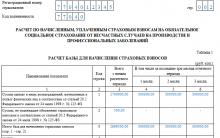Many regular readers ask me, how not to waste money in vain and correctly manage your own resources so that there is always enough money? Especially for you, I have come up with several rules that have greatly helped me achieve success myself.
1. Don't compare yourself to people who are luckier than you. Such comparisons tend to block potential and literally paralyze a person. It is better to praise yourself for what you have already achieved and set the bar higher.
2. You should imagine achieving your goal from the perspective of a sports competition, fighting with the only opponent worthy of you - yourself.
You can break a big goal into small ones and purposefully move towards your cherished dream. But along the way, you need to stop for a while to compare your actions and think, are you on the right path? It is possible that you are moving away from him.
For example, you are going to go on a trip to the USA, but for some reason you cannot refuse a detailed plan, although this is not necessary. Therefore, you will not be able to move towards achieving your goal.
3. Arm yourself with the methods of rich people, read what they did to achieve their success. Observe, experience and learn, learn, learn. And then you will certainly succeed. Be prepared to learn everywhere. See what qualities help your colleagues move forward, learn from them by watching how they solve problems.
4. Separate your confidence from your bank account and constantly develop it: losing confidence is incomparably worse than losing money.
5. Do you know why you decided to increase your income? Think about your own motivation, and when you earn money, imagine what you will spend it on.
6. You shouldn’t be afraid of even your wildest desires; you should learn to think that you are a person who can spend a large amount of money without fear.
7. Don’t look for easy benefits or easy money. In order to earn them you have to work hard.
8. No matter what you spend your money on, it is your investment; even when buying a cake, you are investing money in your own pleasure. Without forgetting this, you will quickly learn not only to compare investments with benefits, but also to adjust them. In this case, the question “Where did my salary go?” will not stand in front of you.
9. You should learn to distinguish immediate benefits from delayed ones. For example, how not to waste money on precious accessories or, but rather invest them in education, which will help you increase your income later? It's difficult to train yourself, but you have to try.
10. Health and education are win-win investments.
11. In order for “money to flow like a river,” it must work, and not lie like a dead weight.
12. You should spend money easily and with pleasure, but you should avoid thoughtless expenses. Before any purchase, you need to ask yourself, do I really need this?
13. Under any circumstances, try to save some amount, even if it is small, but regularly replenish your capital.
 14. Make it a practice to budget your expenses every day. Thanks to such draconian measures, you can look at the situation soberly and try to limit yourself in some way.
14. Make it a practice to budget your expenses every day. Thanks to such draconian measures, you can look at the situation soberly and try to limit yourself in some way.
15. You should not get into debt. It is better to rely only on yourself and strictly control your spending.
16. The main thing is not to work too hard to get even very big money, and at the same time deprive yourself of all the joys of life.
Go for it!
What rules of enrichment do you manage to follow, dear readers? Which ones are particularly difficult?
Mikhail Arslanov
Reasonable saving is not a difficult matter, but many people misunderstand its principles. In order not to spend a lot of money on purchases, you need to remember only one rule: “You don’t save money by buying cheaper. You save money by not buying too much.”
Just one rule to follow - and the amount of money spent is reduced by 5-30%. Very often purchases appear in the expense column that in fact could not have been made. We offer you 11 tips on how to save wisely without compromising your quality of life.
And the money that you have saved can (and even should) be put aside in a special account financial independence and create a cash cushion.
1. Say no to bad habits.
If you count all the money that goes on cigarettes and alcohol, then in a year you will accumulate a good amount of money, which you can use to go on a good vacation. By the way, this is very good way get rid of bad habit- just sit down and calculate how much money is spent on it per year.
2. Look for a job near where you live.
Or try to move to a house close to work, if you really like it. This will save time and money on daily travel.
3. Team up with friends for commuting to work, to supermarkets, and on vacation. Buy products in bulk at discounted prices and take advantage of discounts and promotions on items you use regularly.
4. Use grocery bags– do not buy plastic bags. Firstly, it is environmentally friendly, and secondly, it saves you money. It is only at first glance that the packages seem cheap. If you buy them every day, you get a very impressive amount in a year.
5. Buy food and household goods at wholesale stores.
6. Think about all expenses in advance. If you want to make a large purchase, be sure to consider the cost of its maintenance. For example, when buying a car on credit, calculate whether you will be able to buy gasoline and periodically carry out maintenance on the car.
7. Avoid prestige shopping. This includes all acquisitions, the purpose of which is to demonstrate to others one’s financial situation. For example, when you purchase an expensive high-status car, but you have nothing to buy gasoline with. This is especially true for teenagers purchasing expensive gadgets, at a time when truly wealthy people make do with mid-priced functional devices.
8. Don't buy too much.
You should not purchase expensive appliances (washing machine, refrigerator) if the old one is in full working order.
9. Don't pay twice for things.
But you need to buy only high-quality shoes and clothes. Cheap options tear 2-3 times faster than quality ones. This means that you will throw away 2-3 times more money without receiving the proper level of comfort.
10. Buy more from online stores.
They often offer more affordable prices for all types of goods due to reduced logistics and overhead costs.
11. Take advantage of discounts.
Don’t forget to use discount coupons and similar online services (for example, Biglion, Groupon, Kupikupon). Firstly, such promotional offers help save up to 85% of the cost of goods and services. And secondly, by looking through the promotions, you will find a huge number of new opportunities for entertainment and relaxation.
Use these simple rules and save wisely!
Want to learn more and learn how to put these principles into practice? Watch the free course "". Here is the link:
I'll say it again: it's FREE!
Money for you!
With love and respect, Evgeniy Deineko.
In this article we will again touch on the topic family budget, namely how to spend money correctly. After all, most people do it completely differently than they would like. Moreover, there are so many temptations around, you really want to buy everything at once: “And it doesn’t matter that I already have almost such a thing. I want her, right now!!!”
We often accept the wrong ones financial solutions regarding purchases. And partly we are not to blame. Entire monopolies and sales industries are playing against us, armed with many tricks and techniques in various fields (psychology, marketing, human behavior, etc.) that push people to make purchases, including unnecessary ones.
Oh, sale!!! I'm buying this dress! Well, even if it’s a little small for me, I’ll definitely lose weight by summer!
Look, promotion! You take 2 pairs of boots, the 3rd is free. Why do I need a 3rd pair? Yes, I don’t even need the 2nd one. Why then do I buy it? Well, this is a promotion, look at the discounts!!
The more money I spend in this store, the more my discount on the card will increase. Well, let it be that the next store is a little cheaper. They don’t have a system of bonuses and discounts.
And what usually happens next? You still haven’t lost weight, your dress is gathering dust in the closet. And in general you don’t like it. The shoes received as a gift during the promotion are still in the box, but you have something to wear. Let's put these off until better times. While you saved up for the discount, so much money was spent on the necessary and unnecessary that you are simply shocked.
If you recognize yourself in these examples, then this article is for you. How not to fall for the tricks of sellers and learn how to spend money correctly.
Don't get emotional
Emotions are one of the most powerful feelings of a person. And it doesn’t matter who you are: a man or a woman, how old you are and what social status you are. They manifest themselves very strongly in everyone. And this is precisely what various marketing tricks of sellers are built on, main goal which, to attract attention potential buyer, interest him and give him an impetus to make a purchase.
There is no need to fight temptations here. They will still get the better of you sooner or later. Just make it a rule to make a decision on a major purchase the next day. So in the evening all emotions will go away and all that remains is a sober, clear head.
Try to answer, just honestly, a few questions:
- Do I really need this thing? If so, how often and where can I use it?
- Can I afford it?
- Or maybe I can spend the money on something else that I need more at the moment?
In most cases, you will be surprised to discover that yesterday, such a necessary thing for you, today you no longer need it so much. If so, then you are on the right track.
Of course, this all concerned large expenses, but there are also all sorts of small, current expenses. The expenses seem to be small, but they can make a big hole in the budget. Especially if you add up all such unnecessary expenses throughout the year, the amount will be simply appalling. But more on that below.
Spending - saving
Remember how often you bought an item in the first store without comparing prices. And then, after the purchase, it turned out that you could buy exactly the same product elsewhere for 10-20% cheaper. Remember the feelings of disappointment that arose during this. But you could spend this saved money on something else useful.
We only considered one purchase. But over the course of the year there will be quite a lot of them. If you set aside the amount saved from each purchase, you can accumulate a decent amount.
Advice. Before you buy an item, compare prices in other stores. In 99% of cases you will find it at a more attractive price. You may have to wait a little for it to be delivered from another city, but such a wait can save you from 10 to 20% of the cost of the product.
If you apply the rule of saving to everything you spend, you can quite easily reduce your monthly expenses by 20-30%. And saving 30% in spending is the same as if you started earning 30% more. Therefore, you can consider saving as a way to get additional income. All you need is desire.
Debts and loans
When buying goods on credit, you are immediately in a disadvantageous position.
Firstly, you buy a product without having own funds, you are spending money that has not yet been earned. It turns out that you start living in debt.
Secondly, buying on credit is always an overpaid amount. You will always overpay. Such an overpayment is always an extra expense in your budget. There is such a thing. It allows you to calculate the time frame for doubling your capital when investing. But it also works when taking out loans. Using this rule, you can easily determine how much you will overpay.
Example. When buying a laptop on credit at 36% per annum, what additional costs you will bear it. According to the rule of 72, in 2 years you will give away 2 times more money. Think about it. In 2 years, you will give money that you could buy 2 laptops (or a laptop and something else useful).
Thirdly, often, when buying goods on credit, you don’t think about whether you can afford it. Would you buy it if you had the money, or would you save up for it and how long would it take you? Perhaps such a purchase will make a serious dent in your family budget.
Environment
There is such a good statement that if you take your closest circle, 10 people (relatives, friends) with whom you communicate closely and calculate their average income, then with a 99% probability it will be approximately equal to yours. Those. you mostly communicate in a circle of equal social status.
This also means that the costs will be approximately the same. And most importantly, the spending categories will be almost the same.
You are influenced by your environment. This forces you to make thoughtless expenses (purchases).
Lyudka has such a cool blouse. Why am I worse than her? I want no worse. And it doesn’t matter that there is no money now. We'll get by somehow.
I go to a simple inexpensive gym, which is located in a neighboring house. But my friends go to a prestigious gym, I should start going there too. Well, even if it’s more expensive, it will take a lot of time to travel. Why am I worse?
I want a new TV. The Petrovs picked up such a cool TV last week. No money? Let's take it on credit and pay it off somehow.
A lot of your spending is influenced by your environment. Your desire to try to look no worse than your friends, to have the same things as them, although by and large completely unnecessary. All this pushes you to make a lot of purchases.
There is only one piece of advice here. Start from point 1 of our article. And if the answer is yes, buy it. If not, it's worth thinking about.
Small and large expenses.
When making purchases, no matter what: large or small, there is one more trick that allows you to understand whether an item is worth buying or whether you can still pass it by.
Imagine that you have no money and in order to get the product you like, you need to spend your time. The amount of time is taken based on your monthly earnings at the main job. You calculate how much a day, an hour, a minute of your time costs and we get the amount of time that you need to exchange for the thing you like.
Example. you wanted new phone for 20 thousand rubles. With your salary of 40 thousand per month, we find that in order to get a phone, you need to spend half a month of work or approximately 11 working days - 88 hours. Are you ready to make such sacrifices?
You will get a more plausible picture if you subtract from your income all fixed and necessary monthly expenses (utilities, food, clothing, cellular communication, Internet, etc.). As a result, you will be left with a more modest amount that you earn per month and which you can spend on purchases.
Let's say you have calculated all the fixed expenses (30 thousand) and as a result, you have at your disposal an amount of 10 thousand.
Total: To buy a new phone, you will need 2 months of continuous use. Are you ready to go for it? Or the phone you have may still last for some time and in fact it is not as bad as it seemed yesterday.
In conclusion
You need to be able to not only earn money, but also spend it correctly. After all, the most important thing is not how much you earn, but how much you have left after spending. It is the ability to manage free money that allows a person to feel more comfortable and confident in life.
Surely in your life there are many examples of families who, with the same level of income, live completely differently. One family barely makes ends meet, living from paycheck to paycheck. Constantly in loans and debts.
Another family constantly goes on vacation, has some savings, eats quite well, buys various expensive things and goods, not on credit, but with their own money.
In addition to all kinds of expenses, she also manages to save at least a small amount every month, but constantly. They know that even .
Have you ever wondered what their secret is? First of all, the ability to spend money correctly. Avoid unnecessary and unprofitable purchases.
Are you trying to solve your overspending problem? You may have frozen yours for this purpose. credit cards, do not travel more than a few kilometers from your city, and do not visit places that might tempt you with new purchases. Yet somehow you still fall short of your budget every month. It's time to break the habit of impulsive spending once and for all.
Savings and willpower
The problem with most advice about controlling impulse spending is that it doesn't focus on the right thing: your willpower. Sure, it can be helpful to literally cut up your credit cards, but that doesn't take away from the fact that you still feel tempted to buy things. Certified Specialist financial planning Carl Richards advises people to create space between the stimulus (your impulse to buy a new gadget you don't need, for example) and the response (your decision to buy the gadget). In other words, it is not just about avoiding an impulse or dealing with consequences, but also about fighting. If you really want to nip the problem in the bud, you should focus on your willpower with the following tips.
Wait
What's the easiest way to test and sharpen your willpower? Make yourself wait.
Try using something called the $100 Rule. When you have the urge to buy something that costs $100 or more, make yourself wait for at least week. This way, you will have time to think about whether you really want the item or whether your purchasing decision was impulsive. You can adjust this amount to suit own budget. Maybe you're broke and even a $25 purchase is out of your budget. Then set the $25 Rule for yourself. Or maybe $100 isn't that much money for your budget. Cool, then set yourself the $1,000 Rule.
The key here is that you simply have to give yourself time to make conscious spending decisions that fit your budget. Plus, there's a bonus: When you wait, you're also giving yourself time to shop around for more discounts or a better deal.

Small expenses
Although, of course, impulsive expenses may not always be large. Sometimes you can buy lipstick you don't need at the checkout or new case for phone on Amazon. For small purchases like these, you can follow the 10/10 rule. If you want to buy something that costs $10, spend at least 10 minutes thinking about that decision. If an item costs more than $10 and you're still not sure about the purchase, it should go back on the shelf. For those impulse purchases this rule really works. Again, you can change the amount to suit your situation.
Additionally, you should consider Amazon Contemplate. This is a Chrome extension that is perfect for this kind of situation. When you click on Amazon to buy something, the extension makes you wait 30 seconds so you can consider whether you really want to make that purchase. Half a minute isn't that long, but sometimes it's enough to keep you from making impulse purchases.
Focus on financial goal
If you have a goal, it will greatly help you to refrain from impulse purchases. When you're saving for something, it's much easier to resist the urge to spend money because you may perceive impulse spending as the enemy of your financial goals. For example, do you want to get rid of all your debts by July? But this new pair of shoes won't let you do that until September.

There's even a technical term for this: opportunity cost. INVESTOPEDIA defines cost as “the loss of potential profits from other alternatives when one is chosen.” In this context, opportunity cost can be considered the thing you give up when you use your money to buy something you don't actually need.
Possibility is the key word here. Let's face it: when you have to deny yourself something you don't really need, you tend to feel like a victim. Nobody likes to be a victim. But if you have financial goals, you can transform “sacrifice” into opportunity. Then you will be able to use your money for the things you need. It's much easier to take control of your spending when you can see how it will benefit you.
Plan your expenses
Many people, when they first start planning their budget, overestimate their own willpower. They believe that they can fight every temptation to spend money, so they do not plan any other expenses that do not fall into the category of debts or bills. You can guess where this leads. In this case, you will, of course, exceed your budget, because this is unrealistic. And once your budget is broken, you're well on your way to overspending.

This means that you must plan your budget realistically. Let's not forget that money is just a tool. You should use it! There's nothing wrong with spending money on what you love, as long as you learn to make your spending strategic. This way, you will get what you want, but at the same time you will not spend money at a crazy pace.
Create a small spending fund or add another category to your budget. Don't go crazy, of course. This doesn't mean you can afford some luxurious lifestyle. It's just a small amount of money that you can spend whenever you want to treat yourself to something. This way, you'll have boundaries and guidelines so you can splurge strategically. You can allocate any amount to this fund.
Share your desires
It also helps to spend money on things you love, rather than things you just like. This way, you'll get more out of your spending. Divide your spending into two categories: what you like and what you love. What things do you like to spend money on, and what things do you just spend it on? For example, you may like to spend money on clothes and you may like to use it for travel. Give up the things you simply enjoy and instead focus your spending on the things you love. This will help weed out impulse purchases that you will later regret.
 Here's how financial site Phroogal explains it: “Take a step back and ask yourself: How many purchases have you made that you just love? Quite a few? You are not alone. Imagine that the cigarettes you smoke every day or the coffee you drink at the coffee shop closest to your office cost you money that you could save to go on vacation. You can complain that you don't have money to go on vacation, but at the same time continue to buy things that you don't really need, instead of saving them for something you really love, traveling."
Here's how financial site Phroogal explains it: “Take a step back and ask yourself: How many purchases have you made that you just love? Quite a few? You are not alone. Imagine that the cigarettes you smoke every day or the coffee you drink at the coffee shop closest to your office cost you money that you could save to go on vacation. You can complain that you don't have money to go on vacation, but at the same time continue to buy things that you don't really need, instead of saving them for something you really love, traveling."
Set boundaries
Trying to strengthen your willpower cannot be easy. Part of this process is setting your own boundaries. No one has an unlimited supply of willpower. However, you can probably do more than you think. Despite the difficulties, it is necessary to learn to set these boundaries, especially when it comes to money. These tips are difficult to implement because they focus on restraint, but they will likely pay off in the long run (literally).
Vacation is the most anticipated time of the year, but it can also be the most stressful. This time allows you to relax, but it requires strict money planning. Luckily, there are a few things you can do to help ease your money woes.
Plan your budget
Understand how much you need to spend and on what. Count all expenses, not just the cost of travel and accommodation. Don't forget about excursions, food and souvenirs. And if possible, buy tickets for events you want to attend ahead of time. This will make it easier for you to plan your financial expenses.
Make a list of things
Don't spend money on vacation on unnecessary things that you forgot at home: a swimsuit, a jacket or even a toothbrush. Check your route and weather forecast in advance and pack exactly what you need in your suitcase.
Check your credit card
Transactions abroad can result in hefty fees. If you're not sure about the terms and conditions of your card, just check your bank's website or contact support.
Also make sure you remember your PIN, especially if you are traveling to Europe. They use a chip and signature system less often.
If you need to withdraw money, make sure your bank has ATMs in the city you need. This way you can avoid paying a commission for using the service of another bank.
Call the bank
Tell your bank that you are going on a trip. If you use your card in different places abroad, it may be considered suspicious and it may be frozen.
Many banks allow you to make travel alerts online or use their mobile app.
Make sure you are insured
Many insurance plans don't cover medical expenses abroad, so be sure to buy a travel policy. Some may also cover lost or stolen luggage.
Don't rush to change money
Chances are the exchange rate will be better at your destination. Usually at train stations and airports there are exchange offices, so you're unlikely to find yourself without local currency.
Get your passport in advance
If you're traveling abroad, be sure to apply for your passport (or renewal) at least eight weeks before departure. If you need it done faster, you'll have to pay for expedited service.











Carrying out an inventory
Ulyukaev, Navka and Patrushev
Income tax refund for treatment: registration procedure and calculation of the deduction amount
Import substitution - what is it?
OSAGO minimum insurance period